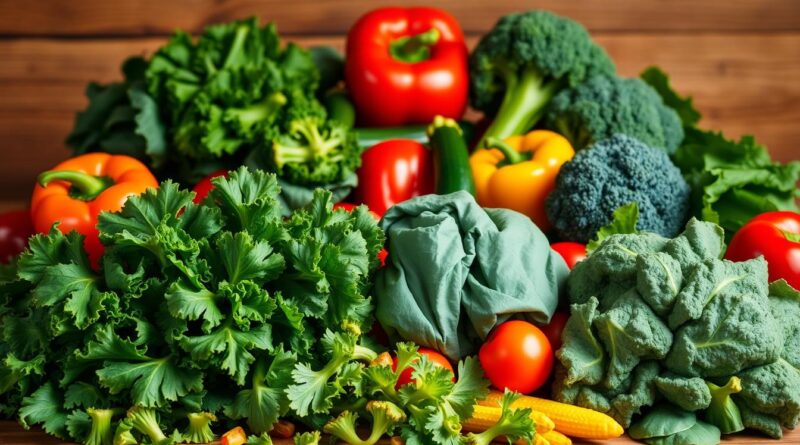Top 10 Low Carb Vegetables Dietitians Love
Eating healthy can be tough, especially picking the right veggies. With many choices, it’s hard to know which are best for a low-carb diet. Low-carb vegetables are key to a healthy diet, offering important nutrients and fiber while keeping carbs low.
Diet experts say adding the right veggies to your diet can greatly improve your health. Vegetables low in carbs are especially good, helping you stay on track with a balanced diet without losing out on nutrition.
By choosing the best low-carb veggies, you can make a meal plan that’s both healthy and easy to stick to. In this article, we’ll look at the top 10 low-carb veggies that dietitians suggest.
Key Takeaways
- Low-carb vegetables are essential for a healthy diet.
- They provide vital nutrients and fiber.
- Incorporating the right vegetables can improve overall health.
- Low-carb vegetables help maintain a balanced diet.
- Dietitians recommend focusing on the top low-carb vegetables.
The Power of Low-Carb Vegetables in a Healthy Diet
Low-carb vegetables are key to a healthy diet. They offer important nutrients without the carbs. They are full of vitamins, minerals, and antioxidants that boost health and wellbeing.
Adding a variety of low-carb veggies to your meals boosts nutrition. It also keeps carb intake low.
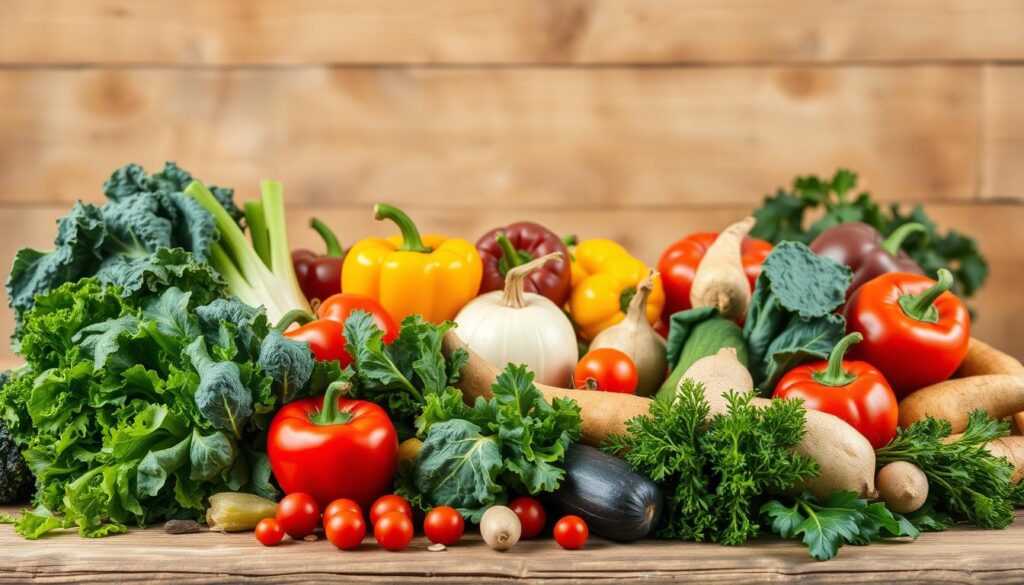
The Science Behind Low-Carb Eating
Studies show low-carb diets help with weight loss and better metabolic health. Low-carb eating means eating fewer carbs. This lowers insulin levels, helping the body use fat for energy.
This change can lead to weight loss and better blood sugar control.
How Dietitians Define “Low-Carb” Vegetables
Dietitians say veggies are low-carb if they have less than 5 grams of carbs per serving. Leafy greens like spinach and kale are good examples. So are broccoli, cauliflower, and zucchini.
These veggies are low in carbs but high in nutrients. They’re great for a healthy diet.
Health Benefits of Incorporating Low-Carb Vegetables
Low-carb vegetables offer more than just weight loss benefits. They can improve your overall health. Adding them to your diet can make a big difference in your wellbeing.
Weight Management and Fat Loss
Low-carb vegetables are rich in fiber and water content. This makes them very filling, helping with weight management. Research shows that diets high in fiber can lead to more weight loss and better body shape.
Vegetables like broccoli and cauliflower are low in carbs but high in fiber. They are perfect for those trying to lose weight.
Blood Sugar Regulation for Metabolic Health
Eating low-carb vegetables can help control blood sugar levels. Vegetables such as spinach and kale are full of antioxidants. They improve insulin sensitivity, which is key for metabolic health.
By adding a variety of low-carb vegetables to your meals, you can manage your blood sugar better. This reduces the risk of metabolic disorders.
Nutrient Density Without the Carb Load
Low-carb vegetables are full of essential nutrients without the carbs. For example, a table comparing the nutrient density of various low-carb vegetables per serving might look like this:
| Vegetable | Carb Content (g) | Vitamin A (IU) | Fiber (g) |
|---|---|---|---|
| Broccoli | 5 | 1000 | 5 |
| Spinach | 1 | 2800 | 4 |
| Kale | 3 | 2000 | 5 |
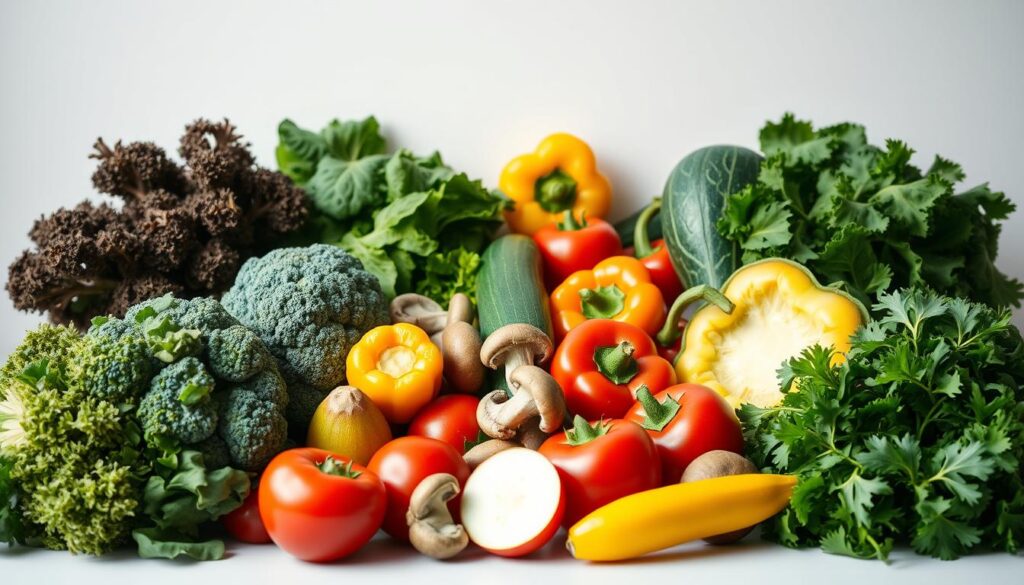
10 Low Carb Vegetables Dietitians Love for Various Health Goals
The top low-carb vegetables are not only tasty but also full of nutrients. They are a favorite among dietitians. These veggies are chosen for their nutritional value, low carb content, and versatility in cooking.
Why These Vegetables Made the Top 10 List
Dietitians pick veggies based on their nutrient density and low carb levels. The top 10 list includes veggies rich in vitamins, minerals, and antioxidants. They are also low in carbs.
These veggies are known for their high fiber, helping with weight management, and blood sugar control.
| Vegetable | Carb Content (per serving) | Nutritional Highlights |
|---|---|---|
| Broccoli | 5g | Rich in Vitamin C and K |
| Cauliflower | 5g | High in Vitamin C and fiber |
| Spinach | 1g | Packed with Iron and antioxidants |
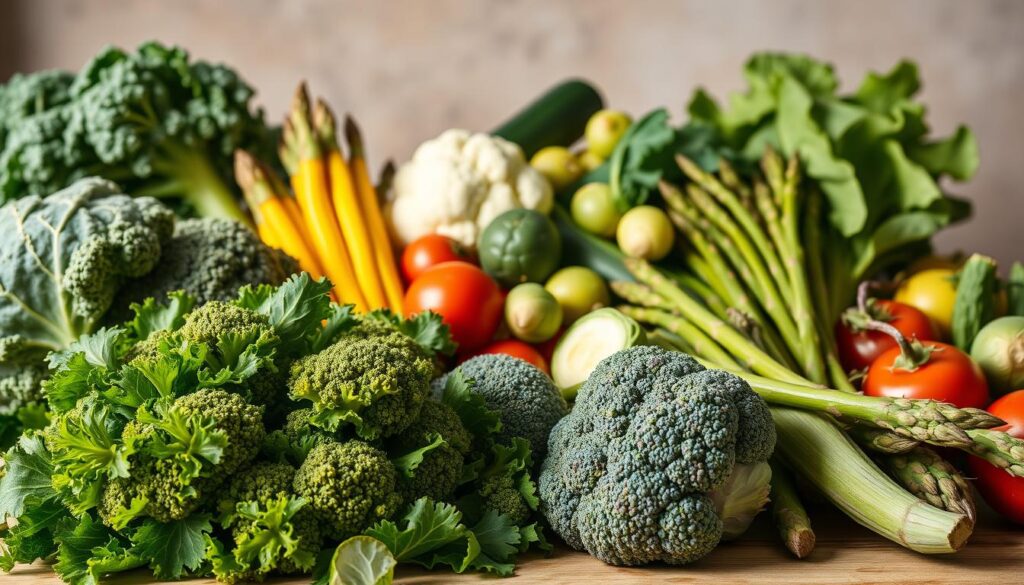
How to Measure Carb Content in Vegetables
To find out carb content in veggies, check the USDA database or the nutrition label. This is true for packaged or frozen veggies.
Knowing the carb content helps in making better food choices. This is especially true for those with diabetes or following a keto diet.
Leafy Greens: Nature’s Low-Carb Superfood
Leafy greens are top picks for low-carb veggies. They’re packed with vitamins, minerals, and antioxidants. This makes them key to a healthy diet.
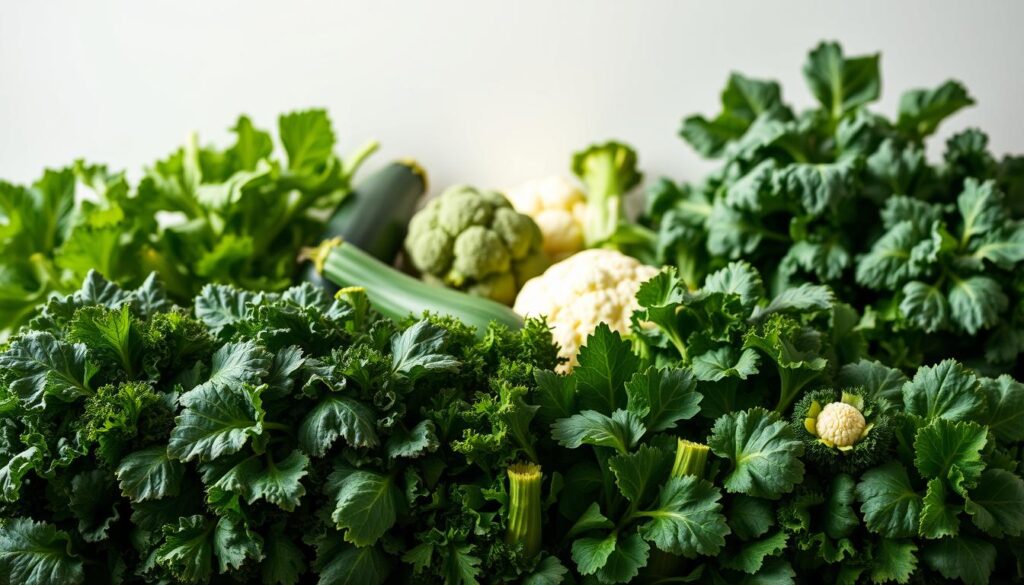
Spinach: Nutritional Profile and Carb Content
Spinach is a nutrient-rich leafy green. It has 3.6 grams of carbs per 100 grams. It’s also full of iron, calcium, and vitamins A and K. Great for salads, smoothies, and more.
Kale: Nutritional Profile and Carb Content
Kale is another super green, with 4.3 grams of carbs per 100 grams. It’s loaded with vitamins A, C, and K, plus potassium and manganese. Enjoy it in salads, sautéed, or in smoothies.
Dietitian-Approved Ways to Enjoy Leafy Greens
Dietitians say to add leafy greens to your meals in many ways. Add spinach to omelettes, use kale in salads, or blend them into smoothies. Try new recipes to keep your diet exciting and nutritious.
Cruciferous Vegetables: Broccoli and Cauliflower
Adding broccoli and cauliflower to your meals boosts your nutrition. These veggies are packed with vitamins and minerals. They’re also great for your health, making them a top pick for low-carb diets.
Nutritional Profile and Carb Content of Broccoli
Broccoli is full of nutrients and low in carbs. It has only 5 grams of carbs per cup. It’s also rich in fiber, vitamins C and K, and antioxidants.
Nutritional Profile and Carb Content of Cauliflower
Cauliflower is a versatile veggie, full of vitamins and antioxidants. It has about 5 grams of carbs per cup. It’s a good source of vitamin C and K, and tastes great in low-carb recipes.
Creative Cooking Methods Dietitians Recommend
Dietitians suggest steaming or roasting broccoli and cauliflower to keep their nutrients. You can also use them in soups, stir-fries, or as a base for low-carb dishes.
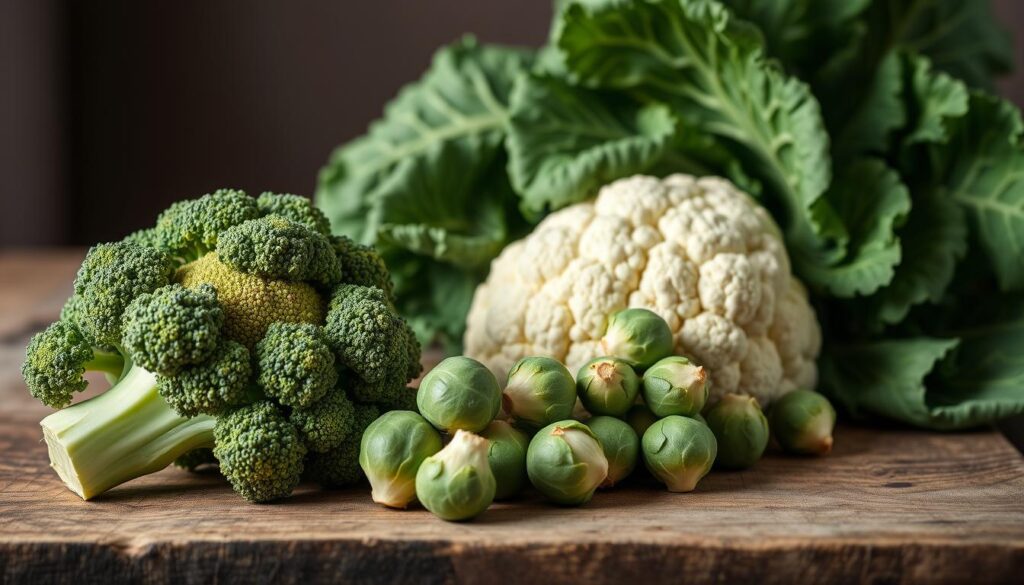
Zucchini: The Versatile Low-Carb Vegetable
Zucchini is a great choice for those watching their carb intake. It’s loved by dietitians and health fans for its many uses and health perks.
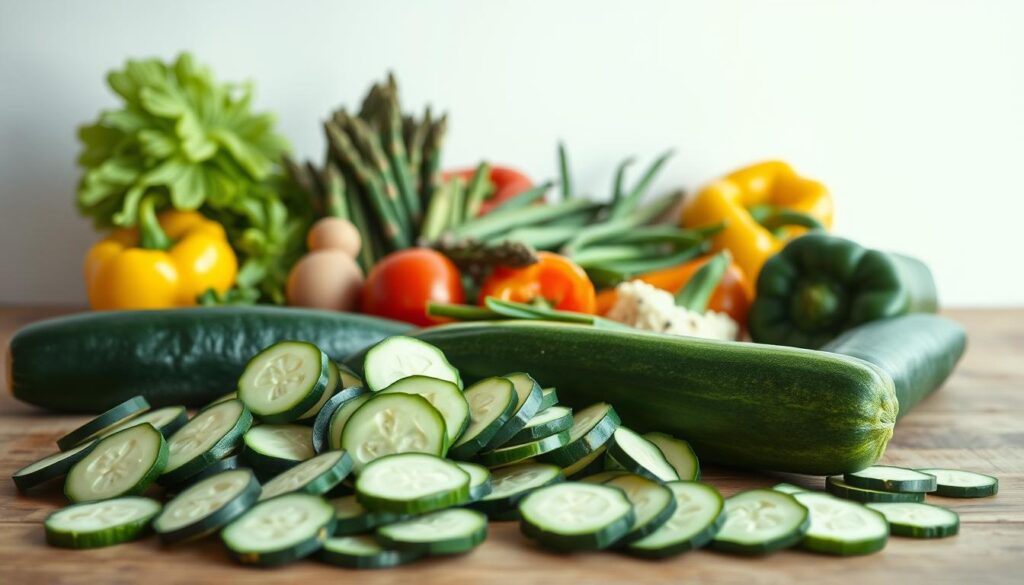
Nutritional Profile and Carb Content
Zucchini is low in carbs and packed with nutrients. A medium zucchini has about 6 grams of carbs, with most being fiber. It’s perfect for weight management or better health.
From Noodles to Chips: Versatile Uses
Zucchini is super versatile. You can make noodles from it, grill it, or bake it into chips. This makes it easy to add to your diet without getting tired of the same dishes.
Dietitian Tips for Maximizing Zucchini’s Benefits
Dietitians say to use zucchini in many ways. Pair it with protein, use it in salads, or add it to soups. This way, you get the most out of this top low-carb veggie while keeping your meals tasty and varied.
Bell Peppers: Colorful Low-Carb Options
Bell peppers are great for low-carb diets because they’re full of flavor and nutrients. They also add a burst of color to any meal.
Nutritional Profile and Carb Content
Bell peppers are low in carbs and packed with vitamins and antioxidants. A single serving, about 1 cup raw, has about 6 grams of carbs. Most of this is fiber, making them good for those watching their carb intake.
Color Variations and Their Unique Benefits
Bell peppers come in green, red, yellow, and orange. Each color has its own health benefits. For example, red bell peppers have more lycopene, an antioxidant found in tomatoes too.
Dietitian-Approved Serving Suggestions
Dietitians say to add bell peppers to your meals in different ways. Try them raw in salads, sautéed as a side, or roasted as a snack. Their sweetness complements savory flavors, making them a great addition to many dishes.
| Color | Carb Content (per cup) | Key Nutrients |
|---|---|---|
| Green | 6g | Vitamin C, Vitamin K |
| Red | 6g | Lycopene, Vitamin C |
| Yellow/Orange | 6g | Vitamin C, Carotenoids |
Asparagus: The Elegant Low-Carb Choice
Asparagus is a classy and healthy pick for a low-carb diet. Dietitians love it for its many uses and health perks.
Nutritional Profile and Carb Content
Asparagus is low in carbs and packed with nutrients. A 1-cup serving of cooked asparagus has about 5 grams of carbs. This makes it perfect for low-carb diets.
Seasonal Benefits and Selection Tips
Asparagus is in season from February to June. Choose firm, bright green spears. Stay away from wilted or soggy stalks.
Dietitian-Recommended Preparation Methods
Dietitians say to steam or grill asparagus to keep its nutrients. Just brush with olive oil, add salt and pepper, and grill until it’s tender.
| Nutrient | Amount per 1 cup cooked | % Daily Value |
|---|---|---|
| Carbohydrates | 5g | 2% |
| Fiber | 2g | 8% |
| Vitamin C | 10mg | 15% |
Mushrooms: Umami-Rich Low-Carb Options
Mushrooms are a top pick for dietitians because they’re low in carbs and full of umami flavor. They add depth to dishes and offer many health benefits. This makes them perfect for those following a low-carb diet.
Nutritional Profile and Carb Content
Mushrooms are low in carbohydrates and packed with nutrients. A cup of mushrooms has less than 1g of carbs. They’re also a great source of fiber, protein, and vitamins and minerals.
| Mushroom Type | Carb Content (per cup) | Nutritional Highlights |
|---|---|---|
| Button Mushrooms | 0.7g | Rich in selenium and potassium |
| Crimini Mushrooms | 0.8g | Good source of copper and selenium |
| Shiitake Mushrooms | 1g | High in vitamin D and antioxidants |
Variety of Mushrooms and Their Unique Properties
Each mushroom type has its own taste and health benefits. Shiitake mushrooms boost your immune system. Oyster mushrooms are full of antioxidants.
Dietitian Tips for Incorporating Mushrooms
To add mushrooms to your low-carb diet, try them in omelets or on salads. Sauté them with garlic as a side dish. Or, add them to soups for extra taste.
Cucumber and Celery: Refreshing Low-Carb Staples
Looking for healthy, low-carb options? Cucumber and celery are great choices. They’re low in carbs and packed with nutrients.
Nutritional Profile and Hydration Benefits
Cucumbers are mostly water, making them perfect for staying hydrated. They also have vitamin K and potassium. With just 4 grams of carbs per 100 grams, they’re a top pick for a low-carb snack.
Debunking the Negative Calorie Myth
Celery is often called a “negative calorie” food, but it’s not entirely true. It has very few calories, about 6 per stalk. But, it takes more energy to digest it than it has calories. Still, celery is full of vitamin K and antioxidants, making it good for a low-carb diet.
Creative Ways to Enjoy These Crunchy Vegetables
Both cucumbers and celery add a nice crunch to many dishes. Here are some ideas:
- Refreshing salads with a citrus vinaigrette
- Low-carb dips like hummus or guacamole
- Stir-fries for a burst of freshness
Low-Carb Vegetables for Specific Dietary Needs
For those with specific dietary needs, the right low-carb veggies can be a game-changer. Different diets need different nutrition plans. Low-carb veggies are key to meeting these needs.
Best Choices for Keto Diet Followers
The keto diet is all about low carbs. Leafy greens and cruciferous vegetables are perfect. They’re low in carbs but packed with nutrients. Spinach, kale, broccoli, and cauliflower are top picks.
Optimal Selections for Diabetes Management
For diabetes, pick veggies low in carbs but high in fiber and nutrients. Asparagus and bell peppers are great. They help control blood sugar and offer important vitamins and minerals.
Top Picks for Gut Health and Digestion
Support your gut with veggies rich in fiber and antioxidants. Cruciferous vegetables and leafy greens are good choices. They help keep your gut healthy and support digestion.
| Dietary Need | Recommended Vegetables | Benefits |
|---|---|---|
| Keto Diet | Spinach, Kale, Broccoli, Cauliflower | Low in carbs, rich in nutrients |
| Diabetes Management | Asparagus, Bell Peppers | Regulates blood sugar, high in fiber and nutrients |
| Gut Health | Broccoli, Cauliflower, Leafy Greens | High in fiber, supports healthy gut microbiome |
Conclusion: Making Low-Carb Vegetables a Sustainable Part of Your Diet
Adding low-carb vegetables to your diet can greatly improve your health. The 10 low carb vegetables dietitians love are tasty and packed with nutrients. They help with weight control and keeping blood sugar levels stable.
By focusing on dietitian approved low carb vegetables, you can adopt a balanced eating routine. These veggies are full of nutrients, fiber, and antioxidants. They’re perfect for boosting your metabolic health.
A good diet is one you can keep up with for a long time. By mixing low-carb veggies into your meals, you’ll enjoy a healthy eating habit. Start exploring low-carb vegetables today and see the many benefits they bring.

